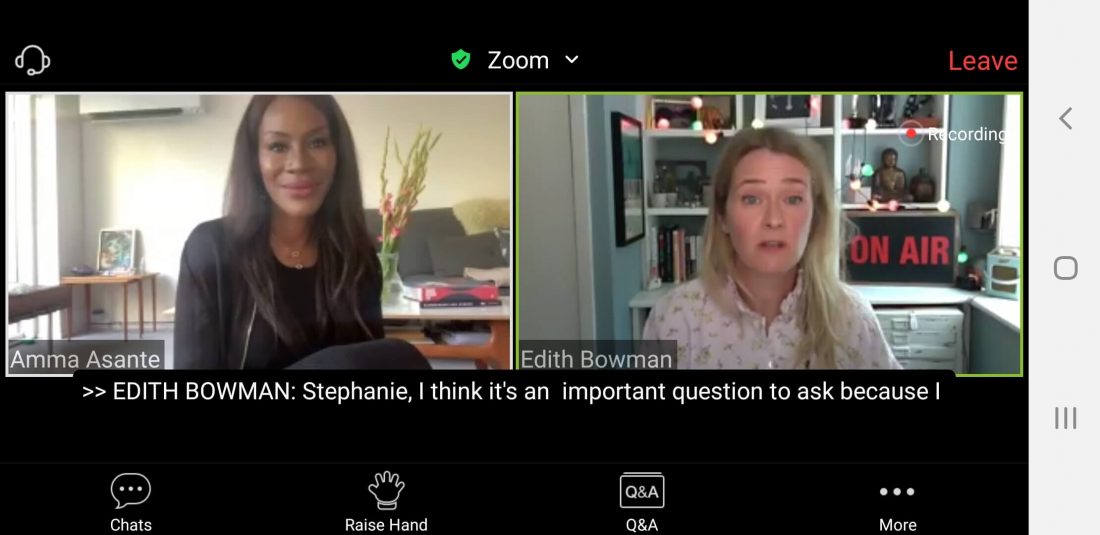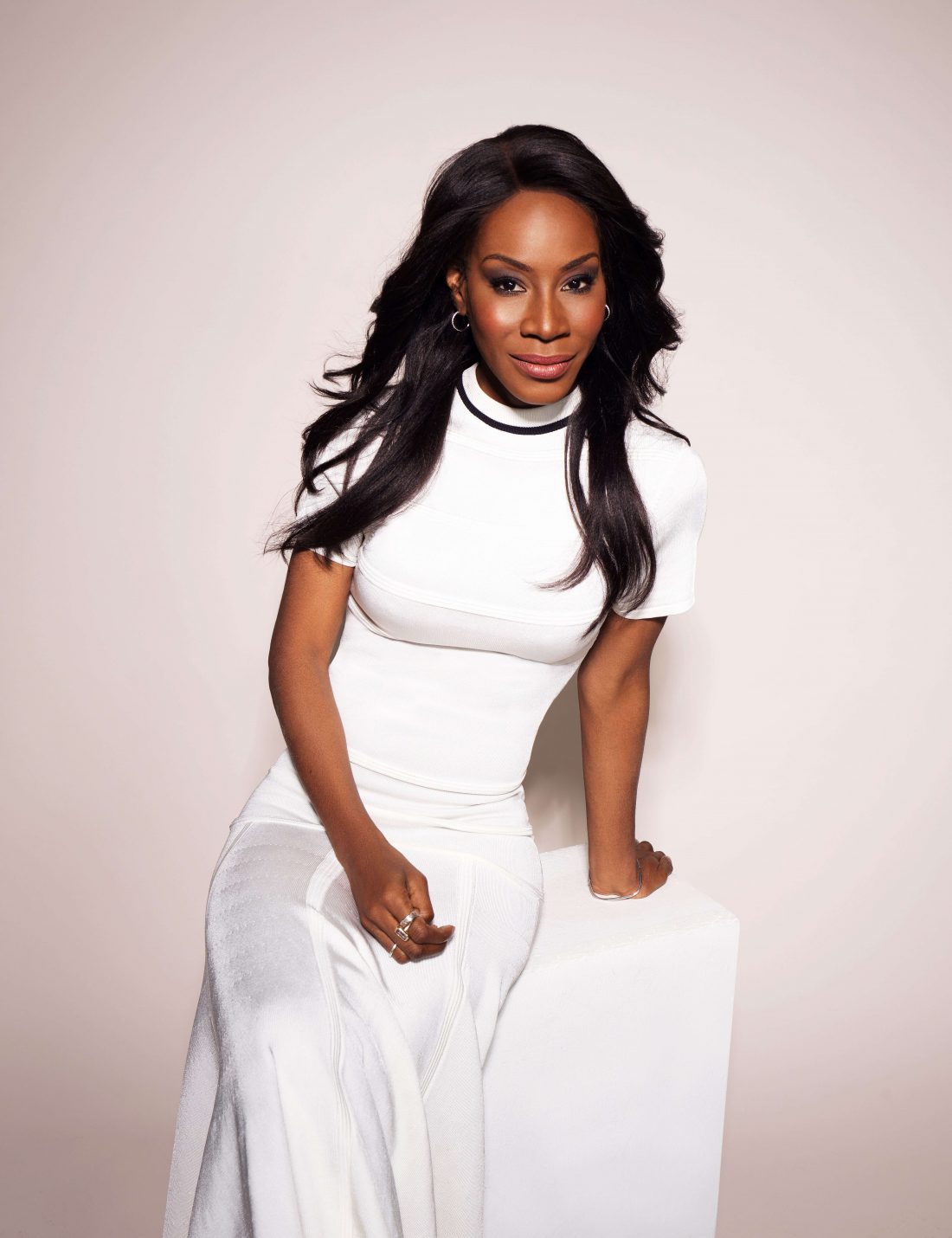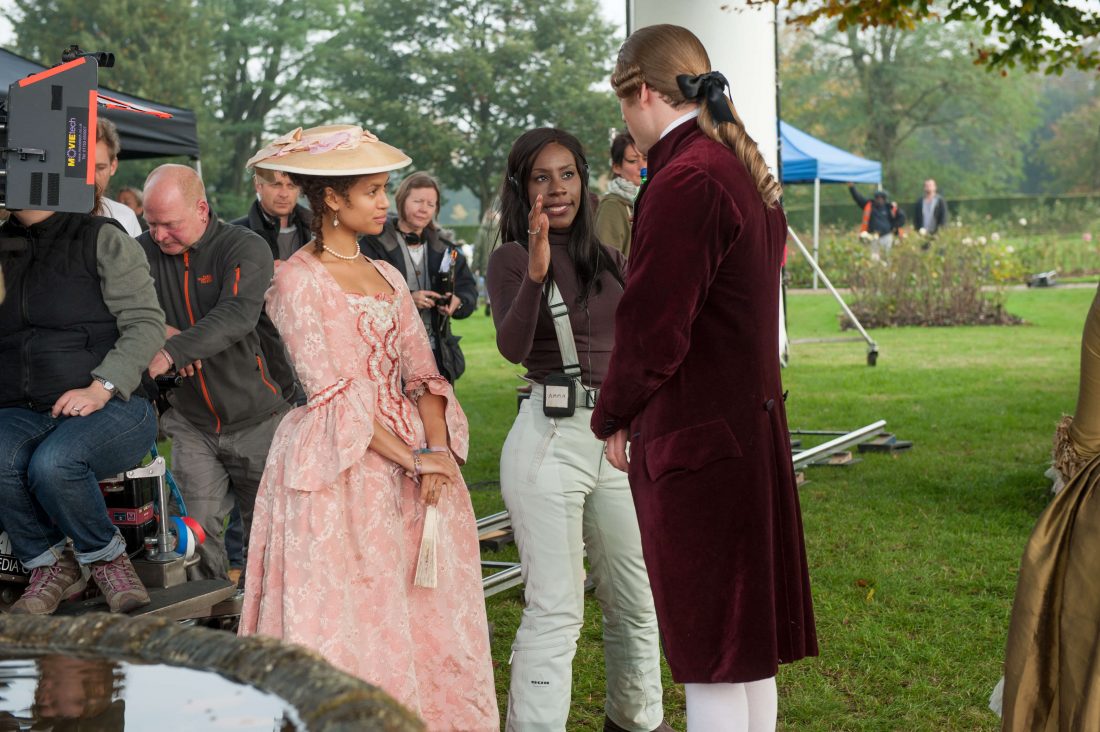The BAFTA-award winning writer and director Amma Asante revealed she’s “waiting for the opportunity” to add a superhero film to her repertoire in an exclusive online chat with presenter Edith Bowman.
More than 1,000 fans of Amma’s worldwide tuned into her BAFTA masterclass this week on Zoom where she shared pearls of wisdom from her long-standing TV and film career, and gave a huge insight into how she approaches screenwriting and directing.

It was during the Q&A that she let fans in on her comic movie secret after Edith read a question from an attendee asking what project Amma would like to direct that seems like an impossibility right now.
She replied: “I’d like to direct a superhero movie, a comic book character movie with a Black female character at its centre. It seems impossible because we’ve definitely seen Black men do it with Black Panther [directed by Ryan Coogler] and we’ve seen white women do it so far with Wonder Woman [directed by Patty Jenkins]…but we haven’t seen a Black female do it yet.
“The industry hasn’t yet trusted a Black woman to do a comic book character, I think, in terms of film not TV. One who has an origin story that goes way back to one of the traditional and classic comics and so I’d love to do that. I’m waiting for the opportunity to do that and bring what I do with relationships and dynamics on screen, bring that to the world of the comic book hero.”
After that @BAFTA masterclass I just want to know who we need to petition to get @AmmaAsante to direct a Black female superhero origin story!! THIS NEEDS TO HAPPEN! Really brilliant advice shared by Amma. Loved it. Thank you!
— machine gun Kele (@kelechnekoff) July 2, 2020
If you didn’t know, Amma’s film and TV career began as a child actress when she starred in Grange Hill and several other series before crossing over to screenwriting. What acting and being in the children’s drama series gave her was “priceless” she told Edith. One of the reasons being it taught her the power of storytelling.
Fast forward to 2020, Streatham-born Amma Asante has an MBE for services to film and is one of the just 2% of Britain’s Black, Asian and ethnic minority female directors, according to a 2015 study of British films titled Calling the Shots. She became the first woman to receive the British Urban Film Festival Honorary Award in 2018 and has directed two episodes of the BBC’s nine-part political drama Mrs America, following different women involved in the campaign to pass the 1970s Equal Rights Amendment in the US.
Unbought and unbossed. The first time I put on the full Shirley costume. A gift to wear the wig, the dress and the glasses, and see the world through #ShirleyChisholm‘s eyes for this role. 👑 The first three episodes of #MrsAmerica are officially out now on @FXNetworks on @Hulu! pic.twitter.com/Q0ZUB6OrPR
— Uzo Aduba (@UzoAduba) April 15, 2020
Amma’s Black Girl Magic has always shone bright as an outspoken voice calling for greater representation in TV and film at all levels while doing the work. This is what Melan found out about Amma Asante during this intimate talk and how she stays at least three steps ahead in the game.
Research is everything
As a rule of thumb, any on-screen project of Amma’s will have been researched 100 years to the point in time she’s portraying. If she’s allowed, the initial research will span anything between three to six months.
She said: “It’s really important for me. Apart from giving me knowledge, it also steeps me in the world and allows me to walk for some time in the shoes of the characters that I’m going to be asking you to walk in the shoes of. If I can’t do that, I can’t really ask you to, so that’s the important thing. I do the work you don’t have to do as the audience and hopefully, you reap the end product of that and feel everything I’ve tried to pull together in making it a three-dimensional world.”
The same advice extended to any budding directors who need to know how to prepare a successful pitch. Amma advised to “absorb yourself in the world” you’re representing.
She added: “My pitches are always visual. That moodboard is really important. I spend weeks on mine…You can never research enough.”
Amma always has emerging female filmmakers shadowing her on projects she’s in control of, which she said she prays makes a difference on their CVs or perhaps even helps their own projects get financed.
Always a mentor
It was inspiring to learn Amma always has emerging female filmmakers shadowing her on projects she’s in control of, which she said she prays makes a difference on their CVs or perhaps even helps their own projects get financed. For her last film, she had four women shadow.
Amma made the revelation after being asked her thoughts on 12 Years a Slave director Steve McQueen’s comments on the lack of diversity off camera in the British film industry.
She said: “You get into a situation where the industry says: ‘We need experienced people.’ Well, of course, people are going to be more experienced if they have more opportunity and you have less. So we’re in that catch-22 situation where the industry is structured to limit many of us who look like me from getting the experience we need whilst giving so much opportunity to people, who are no more talented, frankly, than we are, but who are more likely to be able to make award-worthy movies, work with bigger actors, bigger names, simply because they have been able to hone their skills.”
Amma then went on to speak about how Black people in the industry shouldn’t “just be at entry level”.
She continued: “Despite the obstacles, and I guess that’s why they call us ‘magic’, because despite the obstacles, we still manage to deliver quality work, and yet constantly, we’re referred to in the realms of ‘new’ and ‘beginners’. I don’t only want to be facilitating opportunities for people at entry level.”
She added: “It’s a multi-thronged attack that we need. Everyone knows the time we’re in right now. It’s up to all of us as a society to make this moment meaningful and to make this moment count, and that’s what I’m really trying to do.”

Image credit: Joseph Sinclair
Failure breeds growth
In her early 20s, Amma experienced both success and failure but it’s her perspective on what happened that is so powerful. When an early comedy story she turned into a script landed a development deal with Channel 4 and the BBC – it marked the beginning of her career, she recalled. It paid her enough to keep a roof over her head and not have to work so she could write. But when new commissioners came in and wiped the slate clean, Amma’s project went too and three years of development work.
She said: “Both of those projects technically led to nothing. I say spiritually, they led to everything because I wouldn’t be here today without those. The work got passed around, people understood that I could do a decent job at writing and then I was commissioned to write and co-create Brothers and Sisters and that became the first TV show I did for the BBC.”
“I was commissioned to write and co-create Brothers and Sisters and that became the first TV show I did for the BBC.”
Prove people wrong
When Amma made the period drama and love film Belle, Dido Elizabeth Belle’s very existence in Georgian Britain “proved the idea of what an ‘English rose’ is, is warped,” she said, and so instead decided to “present another kind of English rose”. Namely, one who was mixed-race and the daughter of a slave.
However, the belief was the love story would only interest women and they’d be the ones to shepherd men into the cinemas to watch it. This wasn’t true.
She said: “Men came to see the movie and they loved it for a number of reasons. The challenge and joy for me is to say: ‘Can I service a community or group of many peoples who just don’t get that many stories told about them?’ and secondary to that is to say: ‘How can I get the very opposite of the lead character to sit in the audience and walk in her shoes for two hours and say: ‘I understand my world a bit better than what I did when I came into the movie theatre’. I think a movie like Belle did that in so many ways and there’s a joy and triumph in that.”

Be self-aware
If you didn’t know Amma Asante joined the roster of directors for series three of The Handmaid’s Tale, now you do. When choosing TV projects though, she is careful about what she opts to get involved in.
“I’ve chosen to work on shows that make sense for me,” she said during the webinar. “I remember the first time I saw The Handmaid’s Tale, I thought it was something I could make. It’s beautiful and has a powerful story, but at the same time, it’s aesthetically stunning.”
Coming into an established show or set-up can be daunting, but Amma stressed the beauty of entering as an outsider. At the time, she asked herself: “How do I add to that while still honouring the personality and nature of the show? You’re going in to fit in and stand out at the same time. It’s a delicate balance.” A balance she nailed might we add.
Mrs America will air on BBC 2 on Wednesday 8 July at 9pm. To see Amma’s work, be sure to tune into episode three on Shirley Chisholm and episode 4 focused on Betty Friedan.
Written by Vicky Gayle – Follow her: @vi_gayle












